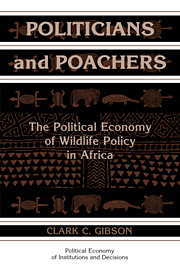Book contents
- Frontmatter
- Contents
- Series editor's preface
- Acknowledgments
- 1 Politics, Institutions, and Animals: Explaining the Content, Continuity, and Change of African Wildlife Policy
- I The National Politics of Wildlife Policy
- II The Bureaucratic Politics of Wildlife Policy
- 4 The Conservationists Strike Back: “Community-Based” Wildlife Policy and the Politics of Structural Choice, 1983-1991
- III The Local Politics of Wildlife Policy
- Notes
- Bibliography
- Index
4 - The Conservationists Strike Back: “Community-Based” Wildlife Policy and the Politics of Structural Choice, 1983-1991
Published online by Cambridge University Press: 02 December 2009
- Frontmatter
- Contents
- Series editor's preface
- Acknowledgments
- 1 Politics, Institutions, and Animals: Explaining the Content, Continuity, and Change of African Wildlife Policy
- I The National Politics of Wildlife Policy
- II The Bureaucratic Politics of Wildlife Policy
- 4 The Conservationists Strike Back: “Community-Based” Wildlife Policy and the Politics of Structural Choice, 1983-1991
- III The Local Politics of Wildlife Policy
- Notes
- Bibliography
- Index
Summary
The project [LIRDP] has originally planned to become sustainable after five years, that means the middle of 1993. But experience is showing that this will not take place. … In the budget for 1992, the project's own income is estimated to cover 4% [of its budget].
Magne Hallaraaker, LIRDP Fourth Annual Meeting, December 11, 1991The previous chapter demonstrated that political institutions provided incentives for politicians and civil servants in ‘Zambia to maintain a wildlife policy that advanced individuals’ political and economic goals, but failed to conserve animals. The political logic of an economically crippled one-party state thwarted those individuals and groups who wanted to augment wildlife policy in Zambia - President Kenneth Kaunda, the Zambian National Parks and Wildlife Service (NPWS), international donors, and local conservationists.
These actors employed new strategies after 1982 to circumvent the impediments presented by members of the party and government. NPWS officers created the Administrative Management Design for Game Management Areas (ADMADE), a new program of “community-based” wildlife management primarily financed by the United States Agency for International Development (USAID). European conservationists, backed by President Kaunda, established the Luangwa Integrated Resource Development Project (LIRDP), a new public agency supported by the Norwegian Agency for International Development (NORAD).
Both LIRDP and ADMADE sought to conserve wild animals by incorporating rural residents in decisions over and benefits from wildlife resources.
- Type
- Chapter
- Information
- Politicians and PoachersThe Political Economy of Wildlife Policy in Africa, pp. 83 - 116Publisher: Cambridge University PressPrint publication year: 1999



